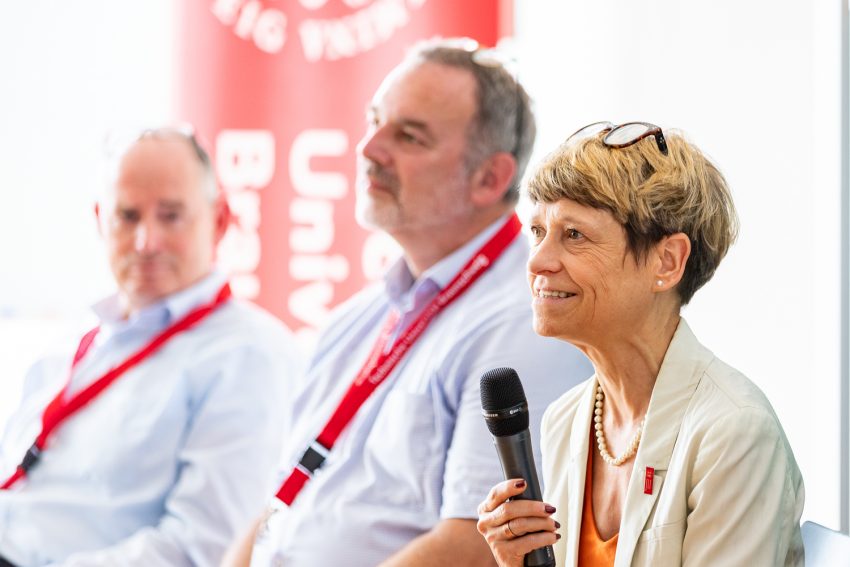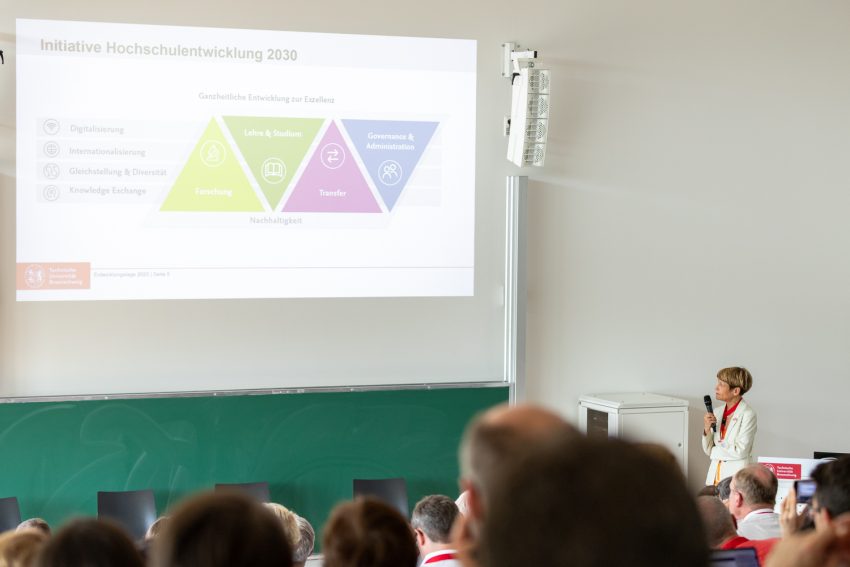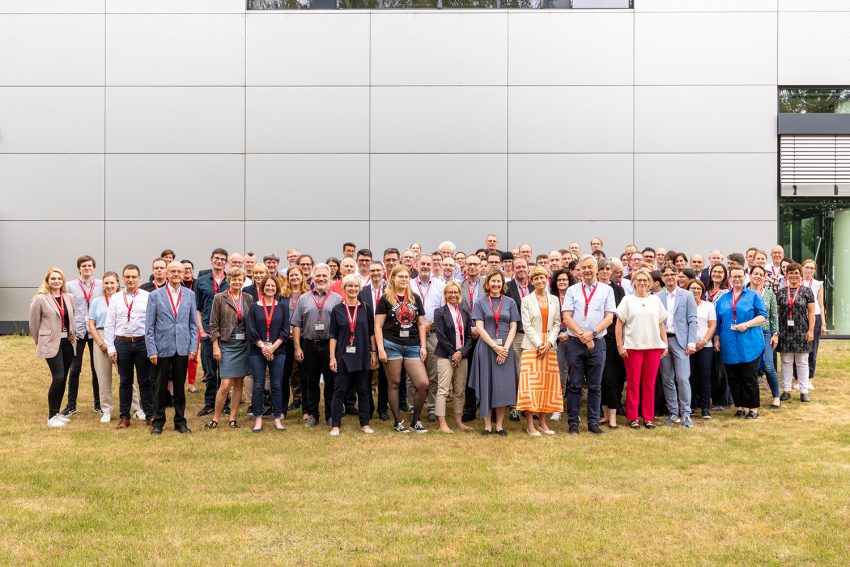What will the university of the future look like? Interview with the President Angela Ittel
With the University Development 2030 Initiative (Initiative Hochschulentwicklung 2030), TU Braunschweig has set out on the road to becoming a university of the future. We spoke to the President of our University, Angela Ittel, about what this means. We also took the opportunity to take stock with the President after almost two years of the University Development 2030 Initiative: What have been our greatest successes and where do we see the challenges for the development of our university? Enjoy the reading!

University Development Days, June 2023: President Angela Ittel (right), Copyright: Kristina Rottig/TU Braunschweig
Ms Ittel, TU Braunschweig wants to reposition itself for the future. What criteria or requirements must a university of the future meet?
Universities are a central place of development for our society. We actively shape our future – for education and prosperity as well as for values and equal opportunities. A university of the future is one that can continue to fulfil this social role in the future. Given the major and dynamic changes in our environment, it is becoming increasingly difficult for universities to fulfil this role.
We are meeting this challenge by continuously developing the areas of research, study & teaching, transfer, governance & administration at TU Braunschweig according to a comprehensive approach. In our comprehensive development model, it is important to achieve contemporary standards in the four performance areas by taking greater account of the overarching issues of digitalisation, internationalisation, equality & diversity and knowledge transfer in all our activities. To achieve this, we are increasingly focusing on the sustainability of our actions.
The model does not require us to do everything all the time, but it does provide us with a kind of grid or checklist against which we can measure our activities. The topics have been given to us as homework in many assessments, reviews and action guides. Now we are tackling them with confidence and measurability. This is not possible for an unlimited number of issues at the same time, especially in research. That is why we are systematically focusing on our four core research areas: Mobility, Metrology, Engineering for Health and Future City. We also owe this success to our strategic partners, both locally and globally. Along with them, we bring together unique competencies in Braunschweig and achieve critical mass for topics with which we can and will shape our future.
Many universities in Germany are implementing processes and projects for university development, revising their structures and work processes. What is special about the University Development 2030 Initiative at TU Braunschweig?
At the TU Braunschweig, we are shaping the process from the bottom up with all member groups and have allowed ourselves sufficient time to do so. In summer 2021 – with great support and initiative from our Project House – the first discussion groups with representatives of all status groups met and collected ideas for our future development. We then condensed these ideas in many further process steps with the participants and deliberately engaged in discourse with external Critical Friends. This outside view is always very important to me, as it gives us a different perspective and allows us to reassess our own cosmos in comparison with others and put it into perspective.

University Development Days, June 2023: President Angela Ittel presents the concept of comprehensive development. Copyright: Kristina Rottig/TU Braunschweig
The University Development 2030 Initiative has been implemented at TU Braunschweig for 1.5 years now. What are the most important milestones and successes of the initiative so far?
I would like to highlight three dates: After many small partial successes, the first major milestone was certainly reached during the first University Development Days in June 2022. At that time, we worked together on the formulation of our University Development Concept 2030 with the model of comprehensive development. In doing so, we deliberately added the areas of administration and governance to the classic performance areas of a university: research, teaching and learning, and transfer. Only if we develop equally in all four areas will we have a realistic chance of competing nationally and internationally on an equal footing with other universities – regardless of whether we decide to apply for the next Excellence Initiative. In doing so, we are focusing on the overarching themes of digitalisation, internationalisation, equality and diversity, and knowledge exchange in all its dimensions. The development of these themes is a necessary condition for our future viability.
Not only I personally, but also the entire Executive Board was pleased with how positive, constructive and committed our first development talks with the faculties were in November 2022. In the meantime, the ministry-sponsored staff unit for university development was also at work and did an excellent job of preparing and following up on these talks. It is a new format for TU Braunschweig that the Executive Board and the faculty have a structured discussion once a year about the strategic development of the faculty and how it fits into the overall strategy of the university. We and I have received a lot of positive feedback on this. We have been told that this has also triggered new participatory processes in the faculties. One of the results of these discussions was the action points – tasks that we formulated for each individual faculty along the dimensions of comprehensive development. I am already looking forward to the next round of discussions in November 2023.
Last but not least, I would like to highlight our University Development Days, which recently brought together more than 100 representatives from all constituencies of our University. Faculties discussed their internal goals with each other and with our Critical Friends. The open discussions and honest feedback were very enriching and I am sure that this exchange will help us a great deal as we move forward.
Where do you see the greatest challenges for TU Braunschweig on its way to becoming a future-oriented and competitive university?
On the second day of the Development Days, we had workshops on overarching issues, in which members from all status groups and faculties worked together to develop strategies on current issues. One focus was on the strategic overarching themes of internationalisation and equality & diversity. But we also continued to refine our strategies for transfer and sustainability, and to explore innovative ways of marketing to students.
We need to expand this kind of overarching collaboration so that we all think more for our university and develop an even stronger shared identity. The Comprehensive Development Model gives us a framework within which to align our activities. Not everyone has to do everything, but together we can move our TU Braunschweig forward in a comprehensive way. This also includes a discourse on how we can further sharpen our profile internally and externally, and how we can make our strengths and topics more visible internationally.
The University Development Days were experienced by the university staff as two very intensive days. How did you find them and what is your personal conclusion after these two days?
I really enjoyed the two days and found them very enriching. It was obviously good for all of us to be in direct contact with so many different people. There was a lot of energy and desire to develop the university.
I was particularly pleased that there was a general openness to engage in discussion with our Critical Friends. This is still a new format for some, and not all the feedback is what you want to hear – but that’s how we develop as members of our University. We are on a very good path here, one that we can be proud of.
What’s next? What are the next steps in the university development process?
The next step is for the Executive Board to meet with all faculties again in November 2023 – this year for the so-called small development talks. From now on, these will alternate every year with the big talks. Instead of focusing on the faculties’ strategic plans, this autumn we want to concentrate on discussing the agreed action items, which each faculty will use to break down the main lines of development for itself.
We also plan to extend the development discussions to the administrative areas of the University in the spring of 2024. These business areas, institutions and staff units have also set themselves goals in the Development Concept 2030, and we will exchange ideas on these.
Thank you very much, Ms Ittel!

